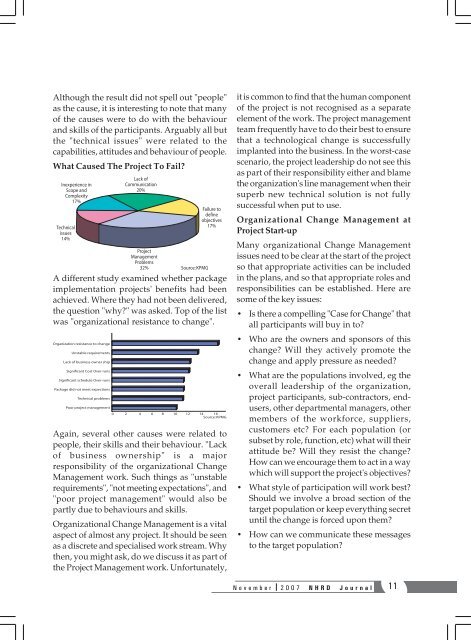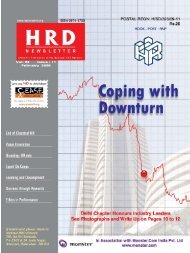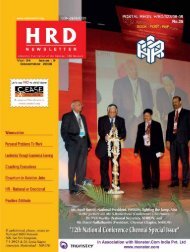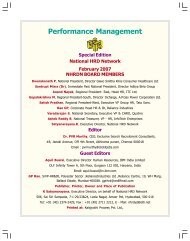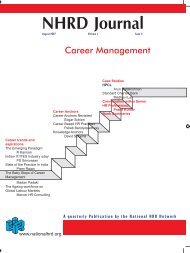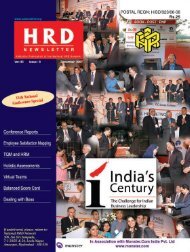NHRD Journal - National HRD Network
NHRD Journal - National HRD Network
NHRD Journal - National HRD Network
Create successful ePaper yourself
Turn your PDF publications into a flip-book with our unique Google optimized e-Paper software.
Although the result did not spell out "people"<br />
as the cause, it is interesting to note that many<br />
of the causes were to do with the behaviour<br />
and skills of the participants. Arguably all but<br />
the "technical issues" were related to the<br />
capabilities, attitudes and behaviour of people.<br />
What Caused The Project To Fail?<br />
Inexperience in<br />
Scope and<br />
Complexity<br />
17%<br />
Technical<br />
issues<br />
14%<br />
Lack of<br />
Communication<br />
20%<br />
Project<br />
Management<br />
Problems<br />
32% Source: KPMG<br />
Failure to<br />
define<br />
objectives<br />
17%<br />
A different study examined whether package<br />
implementation projects' benefits had been<br />
achieved. Where they had not been delivered,<br />
the question "why?" was asked. Top of the list<br />
was "organizational resistance to change".<br />
Organization resistance to change<br />
Unstable requirements<br />
Lack of business owner ship<br />
Significant Cost Over-runs<br />
Significant schedule Over-runs<br />
Package did not meet expections<br />
Technical problems<br />
Poor project management<br />
0 2 4 6 8 10 12 14 16<br />
Source: KPMG<br />
Again, several other causes were related to<br />
people, their skills and their behaviour. "Lack<br />
of business ownership" is a major<br />
responsibility of the organizational Change<br />
Management work. Such things as "unstable<br />
requirements", "not meeting expectations", and<br />
"poor project management" would also be<br />
partly due to behaviours and skills.<br />
Organizational Change Management is a vital<br />
aspect of almost any project. It should be seen<br />
as a discrete and specialised work stream. Why<br />
then, you might ask, do we discuss it as part of<br />
the Project Management work. Unfortunately,<br />
it is common to find that the human component<br />
of the project is not recognised as a separate<br />
element of the work. The project management<br />
team frequently have to do their best to ensure<br />
that a technological change is successfully<br />
implanted into the business. In the worst-case<br />
scenario, the project leadership do not see this<br />
as part of their responsibility either and blame<br />
the organization's line management when their<br />
superb new technical solution is not fully<br />
successful when put to use.<br />
Organizational Change Management at<br />
Project Start-up<br />
Many organizational Change Management<br />
issues need to be clear at the start of the project<br />
so that appropriate activities can be included<br />
in the plans, and so that appropriate roles and<br />
responsibilities can be established. Here are<br />
some of the key issues:<br />
• Is there a compelling "Case for Change" that<br />
all participants will buy in to?<br />
• Who are the owners and sponsors of this<br />
change? Will they actively promote the<br />
change and apply pressure as needed?<br />
• What are the populations involved, eg the<br />
overall leadership of the organization,<br />
project participants, sub-contractors, endusers,<br />
other departmental managers, other<br />
members of the workforce, suppliers,<br />
customers etc? For each population (or<br />
subset by role, function, etc) what will their<br />
attitude be? Will they resist the change?<br />
How can we encourage them to act in a way<br />
which will support the project's objectives?<br />
• What style of participation will work best?<br />
Should we involve a broad section of the<br />
target population or keep everything secret<br />
until the change is forced upon them?<br />
• How can we communicate these messages<br />
to the target population?<br />
November 2007 <strong>N<strong>HRD</strong></strong> <strong>Journal</strong> 11


